The Imperative of Capacity Sharing in Interdisciplinary Sciences
Understanding the complex biogeochemical and physical interactions between the ocean and atmosphere is critical for predicting climate change, assessing planetary health, and implementing mitigation and adaptation strategies that are aligned with the goals of the UN Decade of Ocean Science for Sustainable Development (2021–2030). To comprehensively understand the spatial variability in the coupling and feedback of ocean-atmosphere processes requires a globally distributed, collaborative network with expertise contributed from oceanography, atmospheric science, chemistry, biology, physics, modeling, and increasingly from social sciences, humanities, and policy. Two fundamental challenges must be overcome to significantly advance the ocean-atmosphere research: (1) fostering of interdisciplinary collaboration in science amid an academic tendency toward specialization within disciplines, and (2) overcoming international disparities in scientific capacity, when uneven distribution of scientific effort and access to resources creates barriers to participation and global understanding.
A Model for Interdisciplinary Collaboration and Global Capacity Sharing
Launched in 2004, the international Surface Ocean-Lower Atmosphere Study (SOLAS) research initiative explores the biogeochemical and physical interactions and feedbacks between the ocean and the atmosphere. Driven by the need to understand how these interactions regulate climate and planetary health, SOLAS research informs strategies for future mitigation and adaptation to a rapidly warming world. The program is co-sponsored by Future Earth, the international Commission on Atmospheric Chemistry and Global Pollution (iCACGP), the Scientific Committee on Oceanic Research (SCOR), and the World Climate Research Program (WCRP). As the primary international science organization coordinating research at the air-sea interface, SOLAS integrates oceanographic and atmospheric sciences and provides an example of how to build a successful interdisciplinary, diverse, and international scientific community.
Recognizing the importance of capacity sharing for global interdisciplinary sciences, SOLAS has prioritized developing a strategy that benefits both its own community and the broader Earth system science community. Therefore, SOLAS’s strategies and workflow have served as a model for overcoming key challenges in interdisciplinary research (challenges described in, e.g., Sharuga et al., 2022). By sharing its experiences, SOLAS contributes to a more inclusive and collaborative approach to addressing complex global issues, such as intensified extreme events, climate change mitigation, and adaptation. Here, we present some of SOLAS’s new initiatives and plans for meeting the increasing demands of transdisciplinary (McPhee et al., 2018) research in order to contribute to present and future societal challenges.
Empowering Early Career Scientists
Since its creation, SOLAS has prioritized early career scientist (ECS) training and integration. SOLAS’s flagship initiatives include summer schools and the establishment of a diverse international Early Career Scientist Committee (ESCS; Box 1). These initiatives were specifically designed to ensure SOLAS’s global relevance and to actively foster international capacity sharing and knowledge building, including reaching researchers from countries previously underrepresented in the field (Figure 1). SOLAS 3.0 (2026–2035) will expand on its mission to train, engage, and connect the next generation of ocean-atmosphere researchers while promoting the global coordination of science across the air-sea interface.
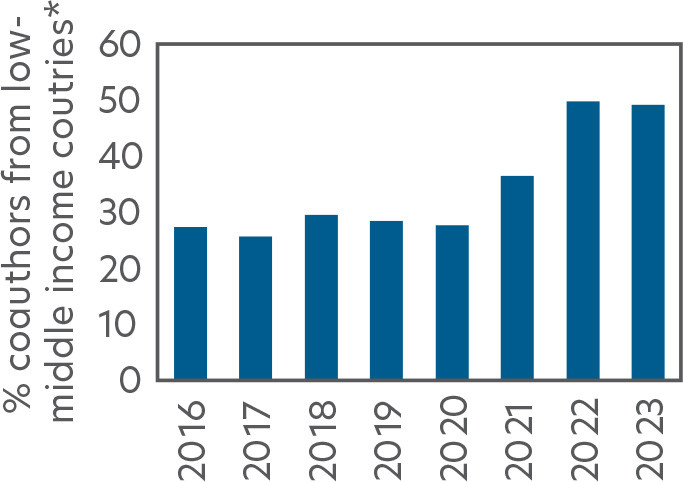
FIGURE 1. Contributions of authors from low and lower-middle income economies* to Surface Ocean-Lower Atmosphere Study (SOLAS) publications (2016–2024) show a ~20% increase over time. Percentages are calculated from an annual average of 323 ± 28 publications. SOLAS publications are defined as products resulting from SOLAS sponsored events (workshops, special issues) and projects, endorsed projects and stations, and products from SOLAS national and regional networks. *Low and lower-middle income economies are based on this SCOR list: https://scor-int.org/work/capacity/.
> High res figure
|
The SOLAS Summer School
Since 2003, the SOLAS Summer School (SSS) has been a cornerstone in training and connecting the next generation of ocean-atmosphere scientists. Starting with foundational knowledge on the key chemical, physical, and biological processes in atmospheric and oceanic sciences, the SSS program progresses to include in-depth exploration of cutting-edge ocean-atmosphere research topics through lectures, practical work, and interactions with international experts and peers. Past SSSs have been held at a range of locations, including Corsica, France; Xiamen, China; and Mindelo, Cabo Verde. In addition, a successful fully virtual summer school was organized in 2022 during the COVID pandemic.
The SSS self-identifies as a dynamic international and interdisciplinary informal science learning program (ISLP). Like other successful ISLPs, it provides interdisciplinary professional and peer networking, (soft) skill development, and cultural exchange (Moskel et al., 2021; Cvitanovic et al., 2024). Recent innovations include parallel sessions to provide discipline-focused learning opportunities and courses on the social implications of ocean-atmosphere research, international laws, and equity, diversity, and inclusion.
The 10th iteration of the SSS, to be held in Brazil in 2026, will emphasize SOLAS 3.0’s focus on societal challenges, through active learning activities such as group projects. SOLAS envisions rotating its future SSS locations to reach a more diverse cohort of international students, including minorities and students from underrepresented regions.
SOLAS’s commitment to the integration of ECS is evident through participating young scientists’ evolution into leadership roles. Currently, 26% of the SOLAS Scientific Steering Committee members, including a co-chair, and 23% of the current SOLAS National/Regional Representatives are SSS alumni. Approximately 20% of the SSS alumni now hold leading roles in non-academic settings that include nongovernmental organizations, industry, and private/governmental sectors worldwide (Figure 2).
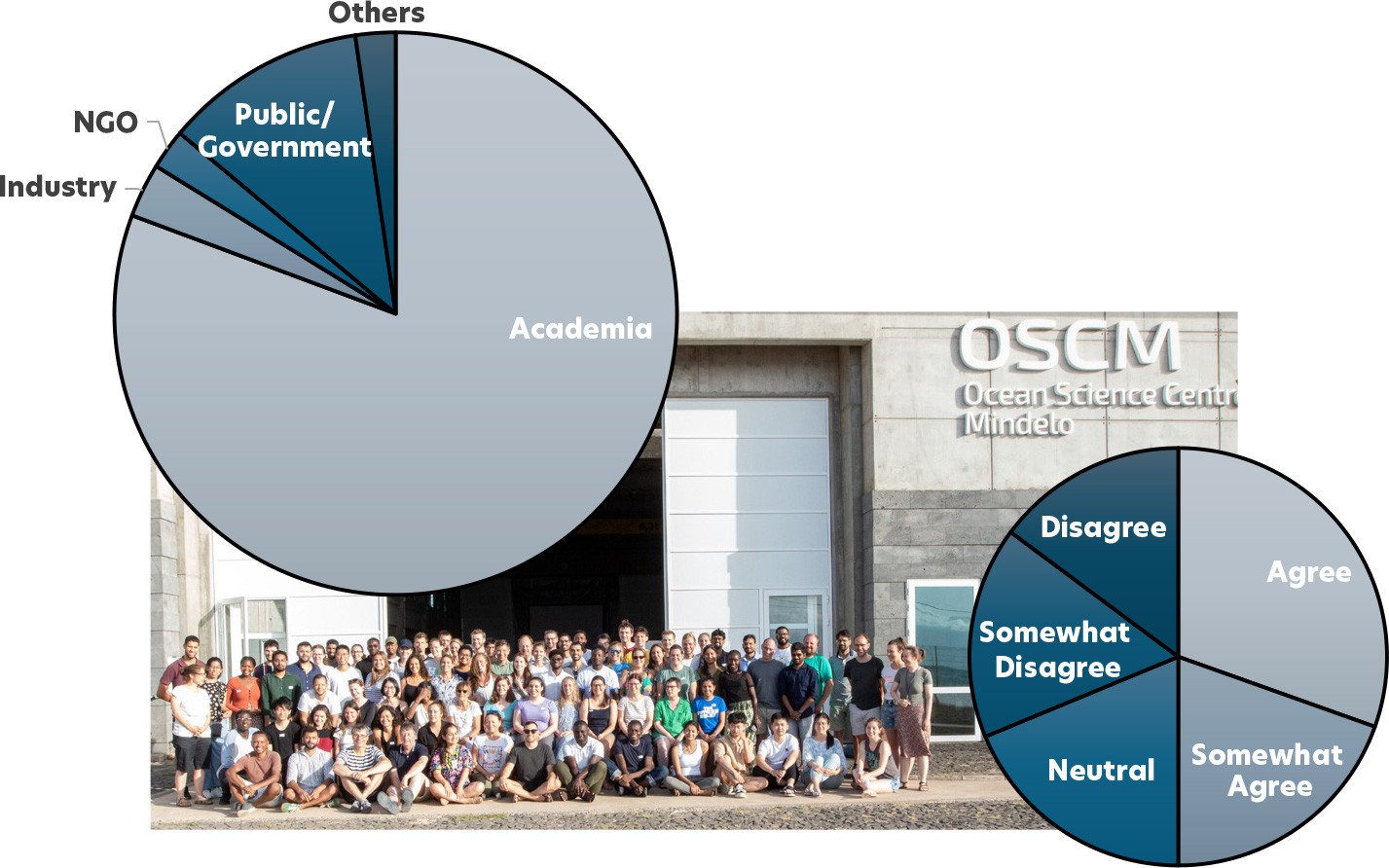
FIGURE 2. The SOLAS Summer School 2023 cohort is shown gathered in Cabo Verde. Pie charts show proportion of alumni current positions (left) and feeling of belonging to the SOLAS community after participating in the summer school (right). Data are based on a survey done in 2021 (n = 128 participants from seven summer schools). To increase participation and update feedback, a similar survey planned in 2025 will include the eighth (in 2022) and ninth (in 2023) summer school participants along with Early Career Scientist Day participants from 2019, 2022, and 2024 Open Science Conferences. > High res figure
|
Mentorship Program Development
To enhance the sense of community among ECSs and provide support as their careers develop, SOLAS 3.0 will implement a new mentorship program focusing on international collaboration and skill development. This initiative is driven by feedback from the SSS alumni survey (2021), which revealed that fewer than half of the participants felt fully integrated into the SOLAS community for the long term (Figure 2). Many SSS alumni express a desire for more formalized and sustained interaction with their peers and for increased mentorship opportunities.
To tailor the mentorship program to the community’s needs, the ECSC held a discussion session at the 2024 SOLAS Open Science Conference (OSC) in Goa, India. Participants stated that being a mentor is highly fulfilling and mutually beneficial. Participants highlighted the importance of the following program components (Figure 3):
- Compassionate guidance, active listening, and continuous support
- Goal-oriented mentorship and a shared commitment to growth, using indicators of success defined by both mentors and mentees
- Frequent assessment through standardized questionnaire responses from both mentors and mentees
- Dynamic relationship of mentorship (many participants regarded themselves as both mentors and mentees)
- Formal acknowledgment of mentorship activities
- A code of conduct and mentorship training
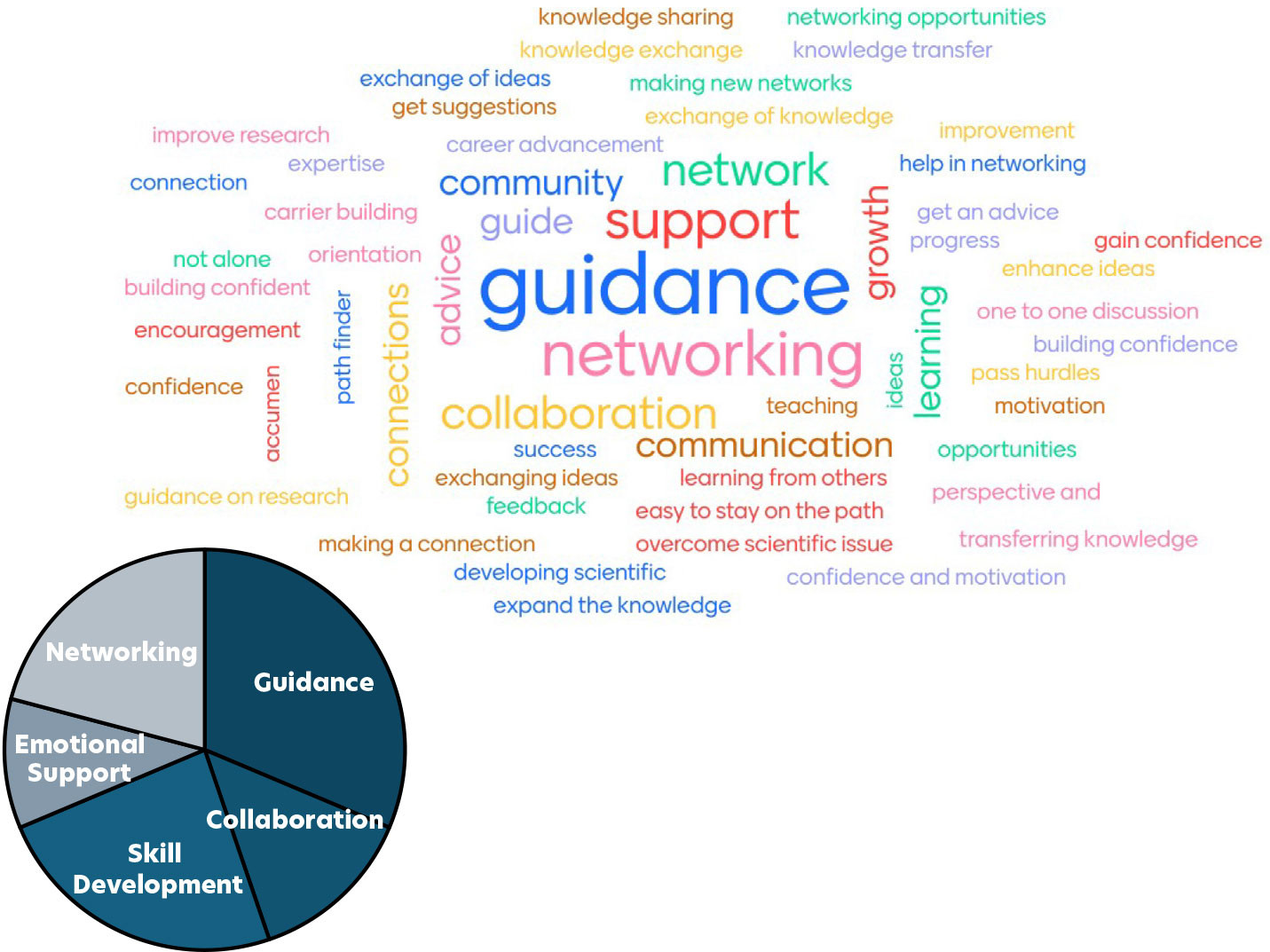
FIGURE 3. Feedback from the mentorship program discussion during SOLAS Open Science Conference 2024. The word cloud describes the benefits of mentorship, and the pie chart describes expectations from the mentorship program. > High res figure
|
The program will first feature peer-to-peer mentorship before developing a traditional mentorship plan. This model will allow ECSs to learn from one another’s unique pathways to science, provide insights into navigating academic and cultural landscapes, and offer continuing contact post summer school participation. SOLAS also plans to organize short-term peer-mentorship events as part of the ECS Day held during SOLAS Open Science Conferences and SOLAS Summer Schools. The aim is to eventually offer long-term mentorships for comprehensive career guidance, interdisciplinary mentorships for skill development, and short-term mentorships for targeted support (e.g., grant applications, navigating new environments, networking at international events).
This comprehensive approach aims to create a vibrant and inclusive mentorship network that promotes collaboration and learning across diverse career stages and cultural contexts, ensuring the continued growth and success of the SOLAS community.
Scientific Synergy, Knowledge, and Resource Accessibility
One of the key scientific dissemination activities organized by SOLAS is the OSC (https://www.solas-int.org/news/events-archive/solas-osc.html). To date, SOLAS has hosted nine OSCs, strategically rotating the location across the globe to enhance accessibility for international researchers from diverse regions (one each in Canada, China, Spain, United States, Japan, South Africa, and India, and two in Germany). Hosting the OSC or the SSS directly benefits the host country by showcasing its science and researchers on an international stage, leading to new national and international collaborations. This has fostered capacity building and increased international representation as evidenced by the integration of scientists from South Africa and India within the SOLAS community following the latest OSCs.
The common OSC structure, which dedicates 50% of conference time to interactive posters and group discussion sessions, has proven an excellent means for developing international collaborations, community, and ECS interactions. Since 2019, the OSC has also organized an ECS Day supported by SOLAS but developed and coordinated by its ECS community. This well-attended event covers topics on scientific and professional development and offers ECSs opportunities to network with peers and step into the SOLAS community before the conference. During OSC 2024, the ECS day was co-hosted by SCOR Working Group 167, Reducing Uncertainty in Soluble aerosol Trace Element Deposition (RUSTED). The aim was to bring together ECSs from overlapping research communities to boost knowledge sharing, networking, support, and training. About 46 ECSs participated, 40% of whom were new to the SOLAS community.
To fully leverage its potential for international collaboration, SOLAS 3.0 will go beyond its core networking events to actively facilitate researcher connection and exchange. This will involve developing a comprehensive researcher database listing SOLAS projects, researcher expertise, and contact details. This database will support the mentorship program, enhance networking activities, and provide a foundation for the SOLAS Centers for Observation, Training, and Solutions (SCOTS) network (Box 2). Furthermore, SOLAS 3.0 will develop a toolbox of best practices for accessibility of data, expertise, and instruments, ensuring that resources and knowledge are readily available to the entire SOLAS community and beyond.
Building Bridges: Steps Toward Inclusive Transdisciplinary Research Communities
SOLAS 3.0 represents a significant step toward a more inclusive, transdisciplinary, and impactful approach for ocean-atmosphere science that aligns with the UN Decade of Ocean Science goal to reduce disparities in ocean sciences through capacity development (Harden-Davies et al., 2022). This next phase will extend SOLAS’s proven model of interdisciplinary collaboration into a truly transdisciplinary realm by integrating humanities, social sciences, policy, and traditional knowledge. Central to this vision is the empowerment of ECSs, whose perspectives and innovative ideas are essential for addressing future societal challenges.
SOLAS’s experience over the past two decades has provided valuable lessons for fostering successful international and interdisciplinary collaborations. A key takeaway, underscored by the alumni and community-driven resumption of SSS in 2018 after a five-year hiatus, was the critical importance of sustained engagement and integration of ECSs within the SOLAS network. Steps taken to address this include establishing the ECSC in 2023 and ongoing development of the mentorship program. SOLAS is also strengthening its efforts to build more inclusive regional networks, fostering greater international participation and capacity sharing by expanding and revitalizing less-engaged national networks.
This model of adaptive, integrative, transdisciplinary collaboration not only addresses the urgent needs of ocean-atmosphere research but also serves as an inspiring blueprint for other transdisciplinary research communities seeking to bridge diverse scientific perspectives and drive impactful global change.
Acknowledgments
This work is an excerpt from the future SOLAS 3.0 Science Plan. We are grateful to the SOLAS IPO, SSC, ECSC, National/Regional Networks, and the full SOLAS community at large for their contributions to the SOLAS 3.0 science plan. We acknowledge funding and support for SOLAS from SCOR (NSF Grants OCE-1840868, 2140395, and 2513154), iCACGP, WCRP, and Future Earth, and the host institute of the SOLAS IPO, the State Key Laboratory of Marine Environmental Science, China (The 111 Project on Marine Biogeochemistry, BP0719030).

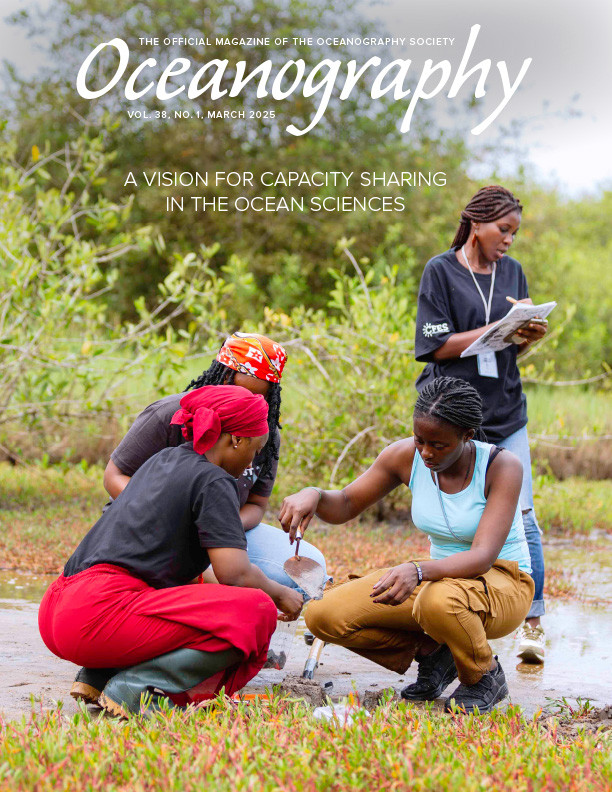
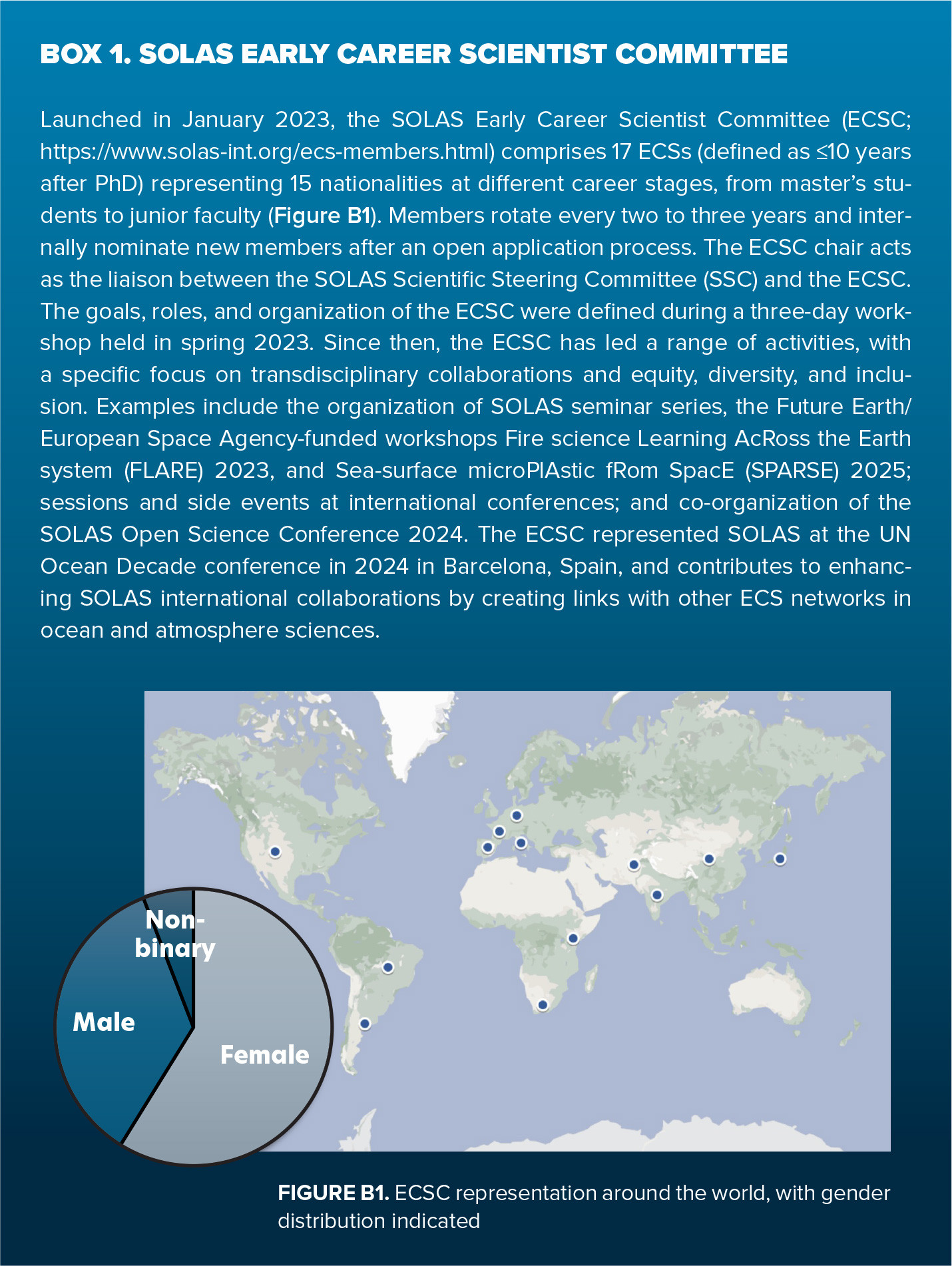 > High res box
> High res box


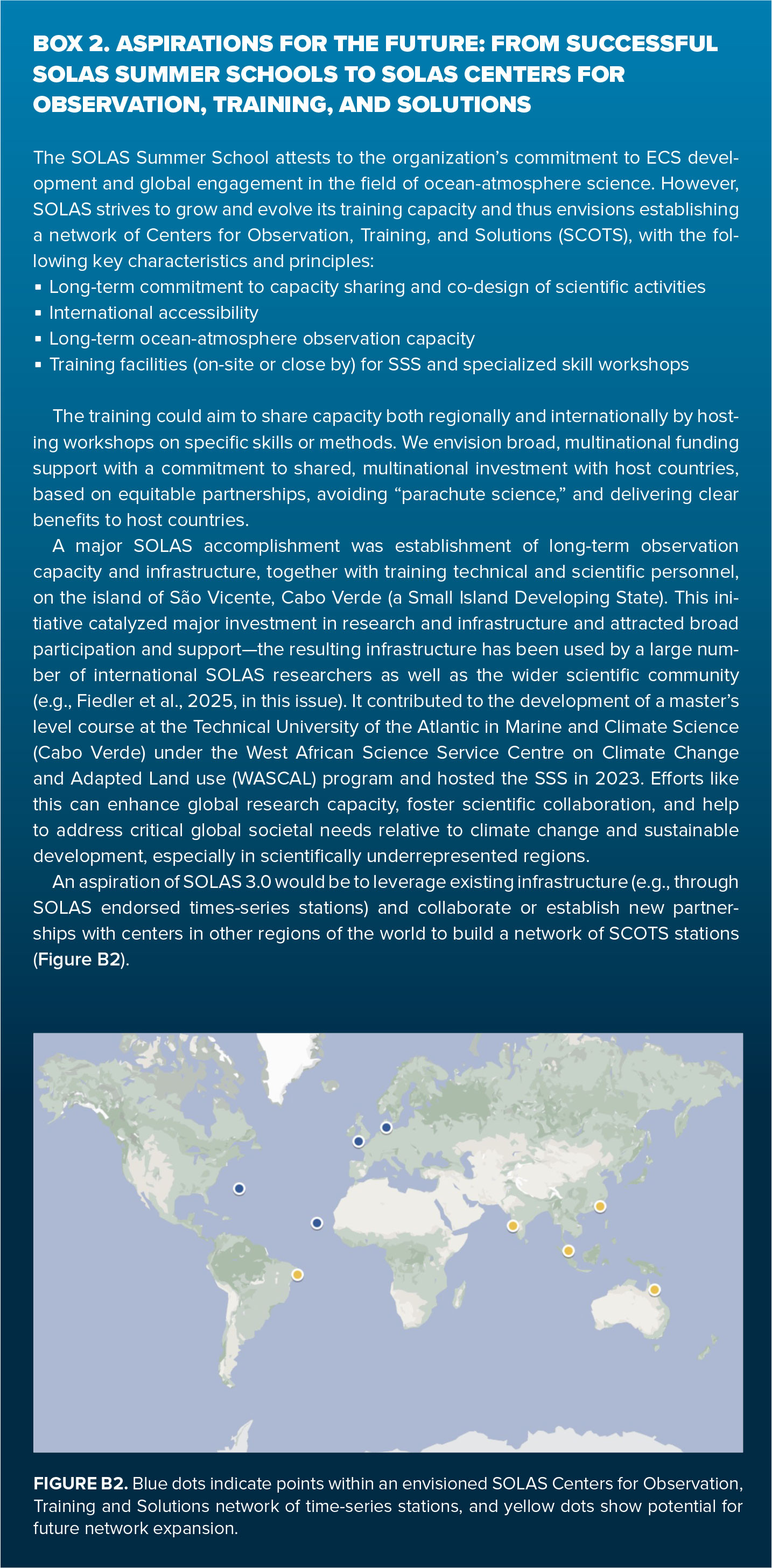 > High res box
> High res box